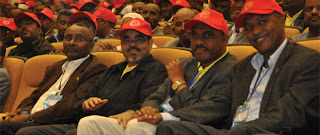On the 21st of September 2012, the urgently
summoned Ethiopian Parliament appointed Hailemaram Dessalegn as PM and Demeke
Mekonnen as Deputy PM. The new premier then presented his acceptance
speech to the Parliament and to the Ethiopian people at large. His speech stood
in direct and monotonous defense of his predecessor’s legacy. The overarching logic
of the speech was that the late Meles was the more than ideal leader of the
century who not only dragged Ethiopia from the brink of disaster and complete
collapse but also one who made Ethiopia to be one of the fastest growing
economies in the world. The implication of this claim is that Ethiopia could
not afford to try a new governance model. One could also spot a lot expressions
loaded with emotions that were intended to beautify the main message.
Sunday, 23 September 2012
Saturday, 15 September 2012
The New Leadership
After weeks of
secrecy and confusion, the Ethiopian political landscape seems surveyable now.
The EPRDF council selected Mr Hailemariam Desalegn and Mr Demeke Mekonnen as Prime Minister and Deputy Prime Minister. The nature of the selection process remains entirely secretive. If it were explained, the selection process could have told us tones of truth, which were vital for making sensible analysis of current and future politics. Hailemariam addressed the Parliament and the Ethiopian people soon after he took the oath. In a nutshell, he said that his leadership will stand in clear defence of the "legacy of the great leader (Meles Zenawi)" and there will be "no change or revision to to be made to his vision". Still, based on his speech, it seems a bit risky to conclude that he will not be a change agent. We need much more information about his background, personality, and importantly the current political climate at Arat Killo.
Thursday, 13 September 2012
Institutions vs Individuals/Parties
Ethiopia is slipping peacefully through
several weeks without an official leader. EPRDF politicians are in battle
for the position while the public is patiently waiting to learn a nomination of
a figure. Although the ruling party tries its utmost to keep power skirmishes secret,
information leaks day by day and reaches the virtual world. We have by now learnt the presence of
competing EPRDF and TPLF groups that entertain alternative strategies for
winning the position. Who will emerge victorious is unclear but history indicates
the relative supremacy of groups who position themselves in fine tone with the
military and security apparatuses. This is the rough truth in Africa,
where the most 'muscular' take all and stay in power until their last breath.
Thursday, 6 September 2012
The Church and the State: Signs and Seals
Following the
deaths of the late Patriarch Abune Paulos and PM Meles Zenawi, Ethiopia finds
itself at a crossroads. Ethiopians are eager to know what trajectory their
country is likely to take. Unfortunately, a lot secrecy surrounds with regard
to leadership succession and power transfer, and hence, it seems difficult to
confidently make a sensible analysis. But there are some signs and 'seals' both
at the church and State levels that grossly point to a degree of optimism and
skepticism, respectively, in the future. Comparatively, the Ethiopian Orthodox
Tewahido Church (EOTC) seems in a pretty better shape so far and seems more
resilient than the State. This post analyzes the implications the signs and the
seals have on Ethiopian
society.
Subscribe to:
Comments (Atom)
Just War and the Fano Struggle: A Brief Moral Evaluation
Moral judgments about war are among the most consequential determinations scholars and societies make. They shape legitimacy, responsibilit...
